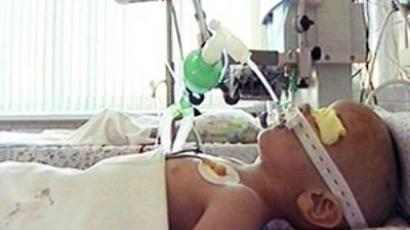US and Russia discuss ways to lift adoption freeze
US and Russian delegations have held the first round of talks aimed at working out a legal document ensuring the safety of Russian children adopted by American parents.
Both parties described the talks as productive.
“We have been heard. Our point of view is understood and accepted by the American side. Today we spoke one and the same language. We understand both sides: Russian children and American families who want to adopt Russian children. We try to work for the benefit of both sides. I hope we could finalize this process as soon as possible, signing a bilateral agreement between our countries,” said Russian Commissioner for Children’s Rights Pavel Astakhov.
“We had very fruitful discussions. We agree that we want to do what’s best for children. We have formed a working group and we will be speaking again, starting on May 12,” said Michael Kirby, head of the US delegation, Deputy Assistant Secretary of the US State Department's Bureau of Consular Affairs.
According to Astakhov, Russia has already prepared the draft of the document.
Moscow wants to see two major articles included in the document. First, it should ensure safe and proper living conditions for adopted children from Russia. The second issue is to create a system that will monitor the fate of children taken to the US.
Astakhov also said that a special body will be created to oversee to the adherence of the treaty. The organization will involve both Russian and American representatives.
Currently there is a temporary freeze on the adoption of Russian children by American foster parents.
“All cases in the court of the Russian Federation are delayed for two weeks. Adoption will continue with a new agreement. But if the agreement is not signed, we can even make an amendment in our family law. Our Parliament is ready to cancel foreign adoption all together,” said Astakhov.
The talks in Moscow have been brought about by the ban imposed by Russian authorities after several cases of severe child abuse of Russian kids by American foster parents.
Since 1992, according to the Ministry of Education, 17 Russian children have died after they were adopted by American parents and brought to the US, reports news agency Ria Novosti.
The case that triggered the freeze was the recent story of seven-year-old Artyom Saveliev, who was adopted by an American mother about six years ago. The woman had sent him back to Russia on his own with a note saying that she did not want the boy any longer.
“I think the whole story, the series of stories, highlights in a very public way the challenges of adoption in general – domestic adoption, too. It is very important to match parents with children in the best interests of the child, rather than, perhaps, interests of the parents,” says Kemlin Furley, UNICEF representative. “On the international adoption fronts, clearly there are rules and procedures. They worked well in most cases. There seem to be exceptions. They should be reviewed,” adds Furley.
The representative points out that domestic adoption should be the priority over international adoption.
“The whole system needs to be developed and improved in Russia,” says Furley.
“The only thing that can prevent that stuff happening to Russian children is the good honest work of all people who are involved in the adoption process,” says Andrey Fyodorov, from Alaska International Adoption agency.
Fyodorov says tough control is necessary both on the legal level and on the level of adoption agencies.
“According to the statistics [the cases of child abuse by foster parents] are very rare and hopefully there will be fewer after the agreement between Russia and the US is signed”, says Fyodorov.
"Russians want to take a more interactive role, and I don’t think that’s a bad idea,” a lawyer from Hellevig, Klein & Usov, Daniel Klein, told RT. “They are looking to put in place some sort of framework whereby they will be able to visit children after adoption and to make sure that adoptions are going smoothly.”
Mirah Riben, author of "The Stork Market: America's Multi-Billion Dollar Unregulated Adoption Industry," believes moving children across borders is not in their best interests.
“It’s changed in the US and Western and Eastern Europe into a process where children are being redistributed to whoever can pay the fees and keep the middle man in business,” Riben told RT. “The line between grey and black market adoption is virtually invisible. People who think they are dealing with reputable agencies often get ripped off, scammed, bad information. There are all kinds of abuses going on because of a lack of regulation; there is just a lack of governmental control.”












